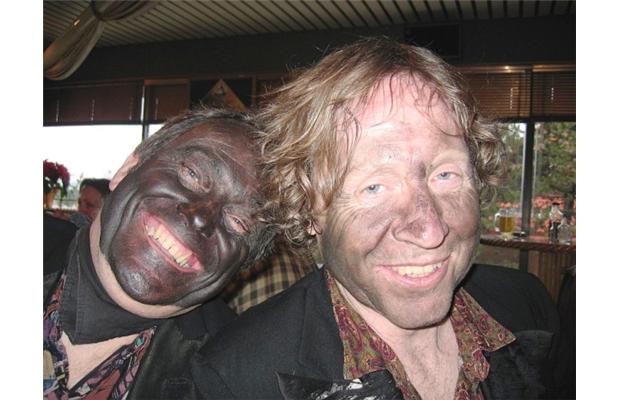Cecily Walker couldn’t believe her eyes when she walked out of her Olympic Village apartment on a recent weekend afternoon to find a group of street performers entertaining at the neighbourhood plaza.

The surprise was not a pleasant one.
An African-American who immigrated to Canada several years ago, Walker said she was stunned to find the Vancouver Morris Men dancers performing traditional English song and dance — in blackface.
“I was just thinking ‘am I really seeing that?,’” she recalled.
Originally from Atlanta, Ga., Walker said she took immediate offence to the use of blackface — black makeup which has traditionally been donned by white performers in an effort to mock, mimic and stereotype African-American culture.
The practice rose to prominence during the Vaudeville era and is considered an offensive and racist taboo in many parts of North America and Europe today.
Cognizant of the filter of her cultural background, Walker said she decided to give the performers the benefit of the doubt. She watched the remainder of the show, and afterward spoke with one of the dancers who told her the face paint represented a tradition of Morris dancers disguising their faces with soot or cork — not impersonating black people.
But Walker said she felt the group hadn’t done enough to explain the context of its costume choice, nor was it immediately obvious to the audience.
She said the performer replied that he’d heard similar concerns before.
- Machinery fire put out at Delta, B.C., coal port terminal: Port authority
- Narcan raccoons, dirty diapers and stuffed animals: 12 of B.C.’s weirdest stories this year
- B.C. family faces 3-year respite funding wait to care for son with rare brain cancer
- Holborn Properties denies it let Dunsmuir House fall apart to force demolition
“Which to me said ‘yeah, we know what we’re doing is hurting people,’” she said.

Get daily National news
After blogging about her experience about a month ago, Walker said she got more than 2,000 hits and the subject ignited a heated debate on social media over whether blackface is ever appropriate. Both Walker and the Morris Men say they’ve received a mix of overwhelming support and vitriolic criticism on various social media platforms.
After doing some research on the Morris Men tradition — which has groups of dancers in communities all over the world — Walker said many have made the choice to paint their faces a different colour, or not to paint at all.
But the Vancouver Morris Men’s Graham Baldwin said his group has been performing in Vancouver in blackface for more than 20 years and has rarely heard complaints.
“We do occasionally get this issue, and it’s usually easily explained,” said Baldwin, noting the group only wears blackface as part of its winter performance routine and paint their faces white in the summer. The Morris Men dancers often hand out brochures explaining the significance of the face paint, he said.
“We are sensitive to the fact that some people misinterpret what we do.”
No permit or license is required by street performers to use the space in the Olympic Village, but performers using the space are required to abide by Parks Board guidelines. The guidelines do not specifically mention offensive content but do say performances “must not jeopardize the comfort and safety of others.”
Baldwin said little is known about the origins of the Morris dance, which dates back to at least the 15th century, but that the tradition has evolved to become “a reflection of the working man’s plight.” One theory holds that Morris dancers were historically ashamed to have to perform on the street for money, so they would obscure their faces with cork or soot. However another theory poses that the term “Morris” evolved from “Moorish” and that the dark faces were originally a form of racial mimicry.
Regardless, Baldwin said he feels it is important for the group to stay close to its traditional roots, although “we’re looking at ways we can continue to do what we do without causing offence.”
He admitted the group would likely not wear blackface if performing in the southern United States, and that some chapters in the U.S. and the United Kingdom have done away with blackface because of its significance is specific communities.
Still, he said he felt the face paint should not be seen as offensive if taken into context in modern, multicultural Canadian society.
“I like to think that Canadian society is a little more liberal than that. I look at the grey in life, not the black and white, if you’ll forgive the pun.”
Walker used the same argument to justify her feelings that the Morris Men should move away from using blackface in multicultural Vancouver.
“I don’t think that the traditions they are celebrating are racist,” she said. “But I think context and geography matters and you can’t really just lift a piece of art out of where it came from and plunk it into a different geography and a different context and expect everybody to have that same understanding.
“So are they racist? That’s not for me to say, but I really think that they should think about the reactions that they get.”







Comments